
Peter Paul Cetera is an American retired singer, songwriter, and bassist best known for being an original member of the rock band Chicago (1967–1985), before launching a successful solo career. His career as a recording artist encompasses 17 albums with Chicago and eight solo albums.

"If You Leave Me Now" is a song by the American rock group Chicago, from their album Chicago X. It was written and sung by bass player Peter Cetera and released as a single on July 31, 1976. It is also the title of a Chicago compilation album released by Columbia Records in 1983.

"You Keep Me Hangin' On" is a song written and composed by Holland–Dozier–Holland. It was first recorded in 1966 by American girl group the Supremes, reaching number one on the Billboard Hot 100. American rock band Vanilla Fudge released a cover version in June of the following year, which reached number six on the Billboard Hot 100. English singer Kim Wilde covered "You Keep Me Hangin' On" in 1986, bumping it back to number one on the Billboard Hot 100 in June 1987. In the first 32 years of the Billboard Hot 100 rock era, "You Keep Me Hangin' On" became one of six songs to reach number one by two different musical acts. In 1996, American country singer Reba McEntire's version reached number two on the US Billboard Hot Dance Club Play chart. The BBC ranked the Supremes' original song at number 78 on The Top 100 Digital Motown Chart, which ranks Motown releases by their all-time UK downloads and streams.

Solitude/Solitaire is the second solo album by former Chicago bassist and vocalist Peter Cetera, and his first album after leaving the band in 1985. It was released in June 1986. The album includes the hits "Glory of Love" and "The Next Time I Fall" ; both reached the No. 1 position on the Billboard Hot 100 chart. Solitude/Solitaire was produced by Michael Omartian, who later co-produced Cetera's 2001 album, Another Perfect World.

"Hard to Say I'm Sorry" is a song written by bassist Peter Cetera, who also sang lead on the track, and producer David Foster, for the group Chicago. It was released on May 16, 1982, as the lead single from the album Chicago 16. On September 11 it reached No. 1 for two weeks on the Billboard Hot 100. It was the group's second No. 1 single. It was their first top 50 hit since "No Tell Lover" in 1978 and it spent twelve weeks in the top 5 of the Billboard Hot 100. The single was nominated for a Grammy Award for Best Pop Performance by a Duo or Group with Vocal, and was certified Gold by the Recording Industry Association of America (RIAA) in September of the same year. Songwriter Cetera, a member of the American Society of Composers, Authors and Publishers (ASCAP), won an ASCAP Pop Music Award for the song in the category, Most Performed Songs.
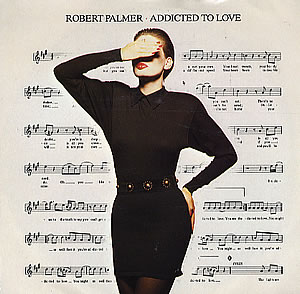
"Addicted to Love" is a song by English rock singer Robert Palmer released in 1986. It is the third song on Palmer's 1985 album Riptide and was released as its second single. The single version is a shorter edit of the full-length album version.

"Sledgehammer" is a song by English rock musician Peter Gabriel. It was released as the lead single from his fifth studio album, So, on 21 April 1986. It was produced by Gabriel and Daniel Lanois. It reached No. 1 in Canada on 21 July 1986, where it spent four weeks; No. 1 on the Billboard Hot 100 chart in the United States on 26 July 1986; and No. 4 on the UK Singles Chart, thanks in part to its music video. It was his biggest hit in North America and ties with "Games Without Frontiers" as his biggest hit in the United Kingdom.

"Invisible Touch" is the title track and first single from the 1986 album of the same name by the English rock band Genesis. The song is a group composition which featured lyrics written by drummer and singer Phil Collins.
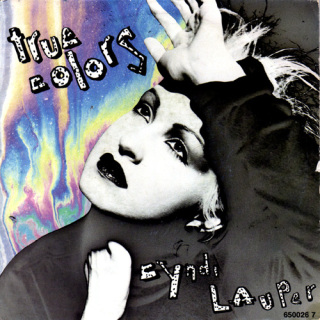
"True Colors" is a song written by American songwriters Billy Steinberg and Tom Kelly. It was both the title track and the first single released from American singer Cyndi Lauper's second album. It was the only original song on the album that Lauper did not help to write. Released late in the summer of 1986, the song would become a major hit for Lauper, spending two weeks at number one on the Billboard Hot 100, becoming her last single to occupy the top of the U.S. chart. It received a Grammy Award nomination for Best Female Pop Vocal Performance.
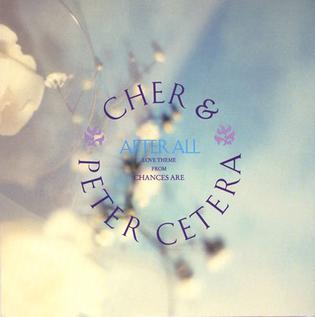
"After All" is a 1989 Billboard Hot 100 hit song performed as a duet by American singers Cher and Peter Cetera, released on February 21, 1989, by Geffen Records. It was used as the love theme for the movie Chances Are and was nominated for Best Original Song at the Academy Awards 1989. The song was also the first North American single release from Cher's nineteenth album Heart of Stone. The song appears on Peter Cetera's 1997 album You're The Inspiration – A Collection and his 2017 album, The Very Best of Peter Cetera.

"Two of Hearts" is a song by American singer Stacey Q, first issued as an independent 12-inch dance club single by On the Spot Records, then picked up by Atlantic after achieving regional sales. Written by John Mitchell, the song was Stacey Q's biggest hit; its global sales success fueled the recording of her debut album Better Than Heaven (1986), which included the song.

"The Next Time I Fall" is a song written by Bobby Caldwell and Paul Gordon and recorded as a duet by Peter Cetera and Amy Grant for Cetera's 1986 album Solitude/Solitaire. It reached number one on Billboard magazine's Hot 100 and Adult Contemporary chart and was nominated for a Grammy Award for Best Pop Performance by a Duo or Group with Vocals. In February 2020, 34 years after its release, it was listed on a Billboard pop music list of top 25 love song duets.

"Hard Habit to Break" is a song written by Steve Kipner and John Lewis Parker, produced and arranged by David Foster and recorded by the group Chicago for their 1984 album Chicago 17, with Bill Champlin and Peter Cetera sharing lead vocals. Released as the second single from the album, it reached No. 3 on the Billboard Hot 100 and was prevented from any more chart movement by "Caribbean Queen " by Billy Ocean and "I Just Called To Say I Love You" by Stevie Wonder. "Hard Habit to Break" also peaked at No. 3 on the Adult Contemporary chart. Overseas it peaked at No. 8 on the UK Singles Chart.
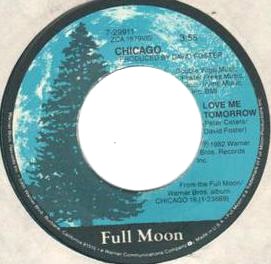
"Love Me Tomorrow" is a song written by Peter Cetera and David Foster for the group Chicago and recorded for their album Chicago 16 (1982), with Cetera singing lead vocals. The second single released from the album, it reached No. 22 on the U.S. Billboard Hot 100 chart and No. 8 on the adult contemporary chart. Songwriter Cetera, a member of the American Society of Composers, Authors and Publishers (ASCAP), won an ASCAP Pop Music Award for the song in the category, Most Performed Songs.
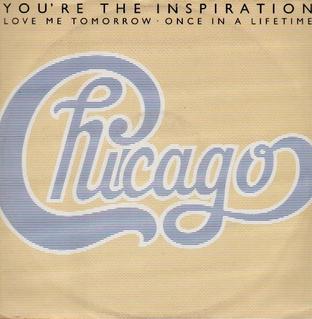
"You're the Inspiration" is a song written by Peter Cetera and David Foster for the group Chicago and recorded for their fourteenth studio album Chicago 17 (1984), with Cetera singing lead vocals. The third single released from that album, it reached No. 3 on the US Billboard Hot 100 chart in January 1985 and also climbed to the top position on the Adult Contemporary chart at the same time. The song won honors for Cetera from the American Society of Composers, Authors and Publishers (ASCAP), in 1986 in the most-performed songs category.
"To Know Him Is to Love Him" is a song written by Phil Spector, inspired by words on his father's tombstone, "To Know Him Was to Love Him." It was first recorded by the only vocal group of which he was a member, the Teddy Bears. Their recording spent three weeks at No. 1 on the Billboard Hot 100 chart in 1958, while reaching No. 2 on the UK's New Musical Express chart. Peter & Gordon and Bobby Vinton later had hits with the song, with its title and lyrics changed to "To Know You Is to Love You". In 1987, the song was resurrected by Dolly Parton, Linda Ronstadt, and Emmylou Harris, whose Trio recording topped the U.S. country singles chart. The song is in 12/8 time. The tune is essentially a slowed-down version of the 1926 hit "When the Red, Red Robin ".

"Will You Still Love Me?" is a song recorded by the American rock band Chicago for their fifteenth studio album Chicago 18 (1986). The song was written by David Foster, Tom Keane and Richard Baskin, and produced by Foster.

"Solitaire" is a song by American singer Laura Branigan. Written by Martine Clémenceau and Diane Warren, produced by Jack White and Robbie Buchanan, it was released in March 1983 as the lead single from Branigan's second studio album, Branigan 2 (1983).

"The Greatest Love of All" is a song written by Michael Masser, who composed the music, and Linda Creed, who wrote the lyrics. It was originally recorded in 1977 by George Benson, who made the song a substantial hit, peaking at number two on the US Hot Soul Singles chart that year, the first R&B chart top-ten hit for Arista Records. The song was written and recorded to be the main theme of the 1977 film The Greatest, a biopic of the boxer Muhammad Ali, and is performed during the opening credits.


















